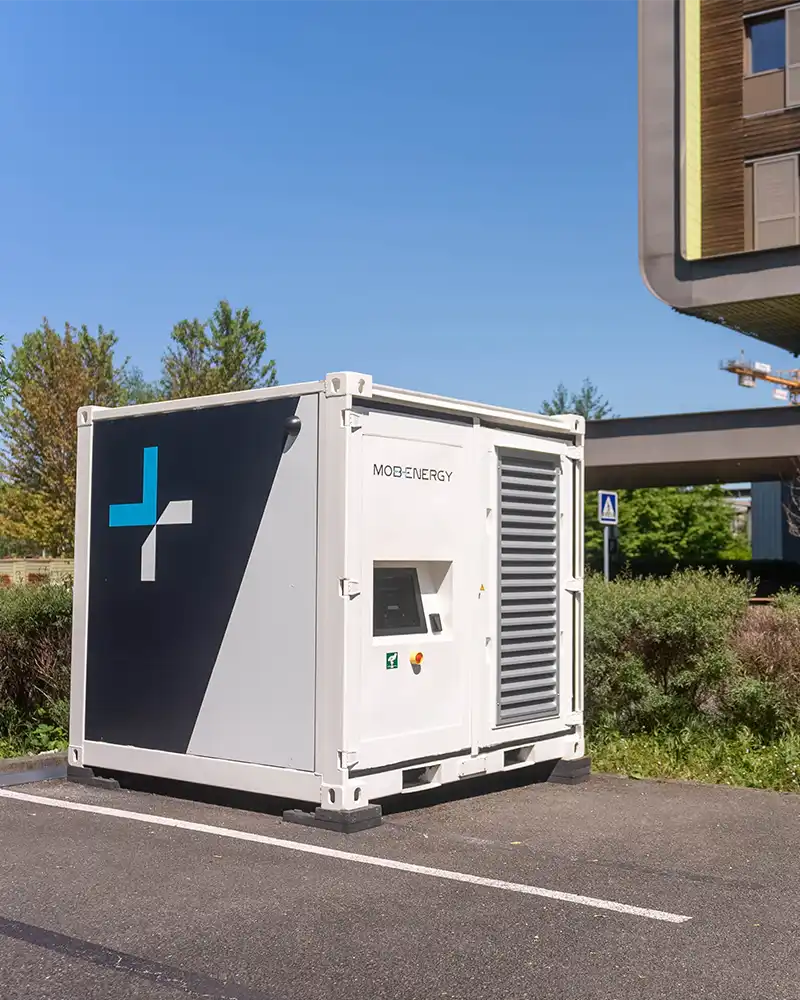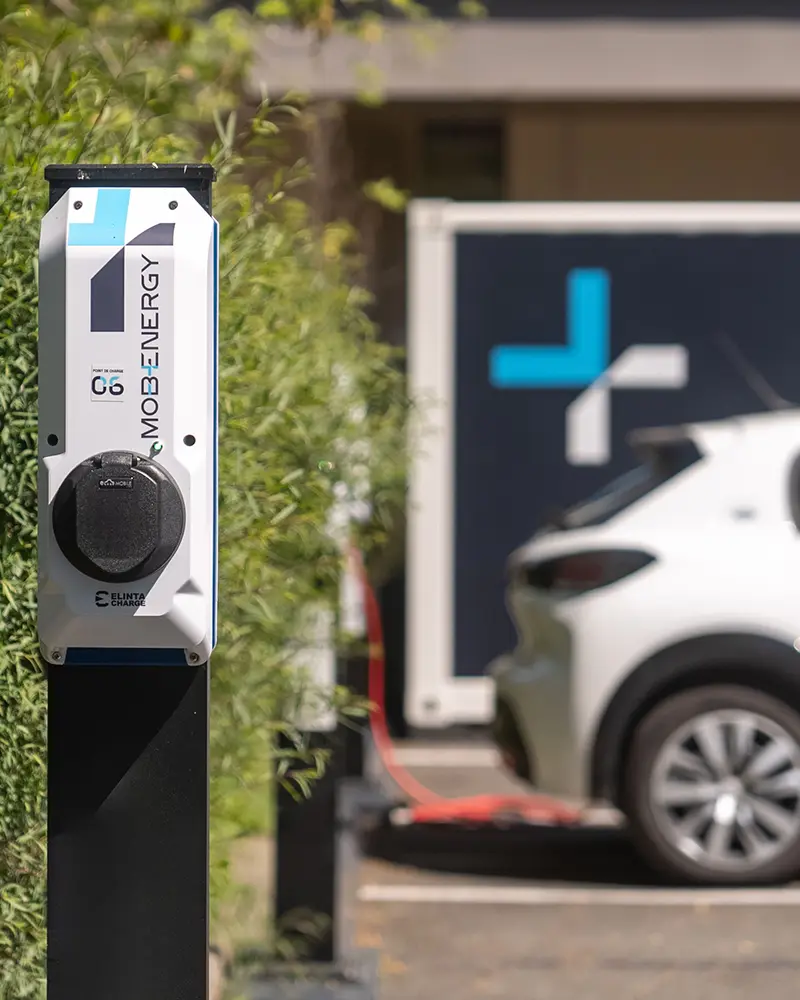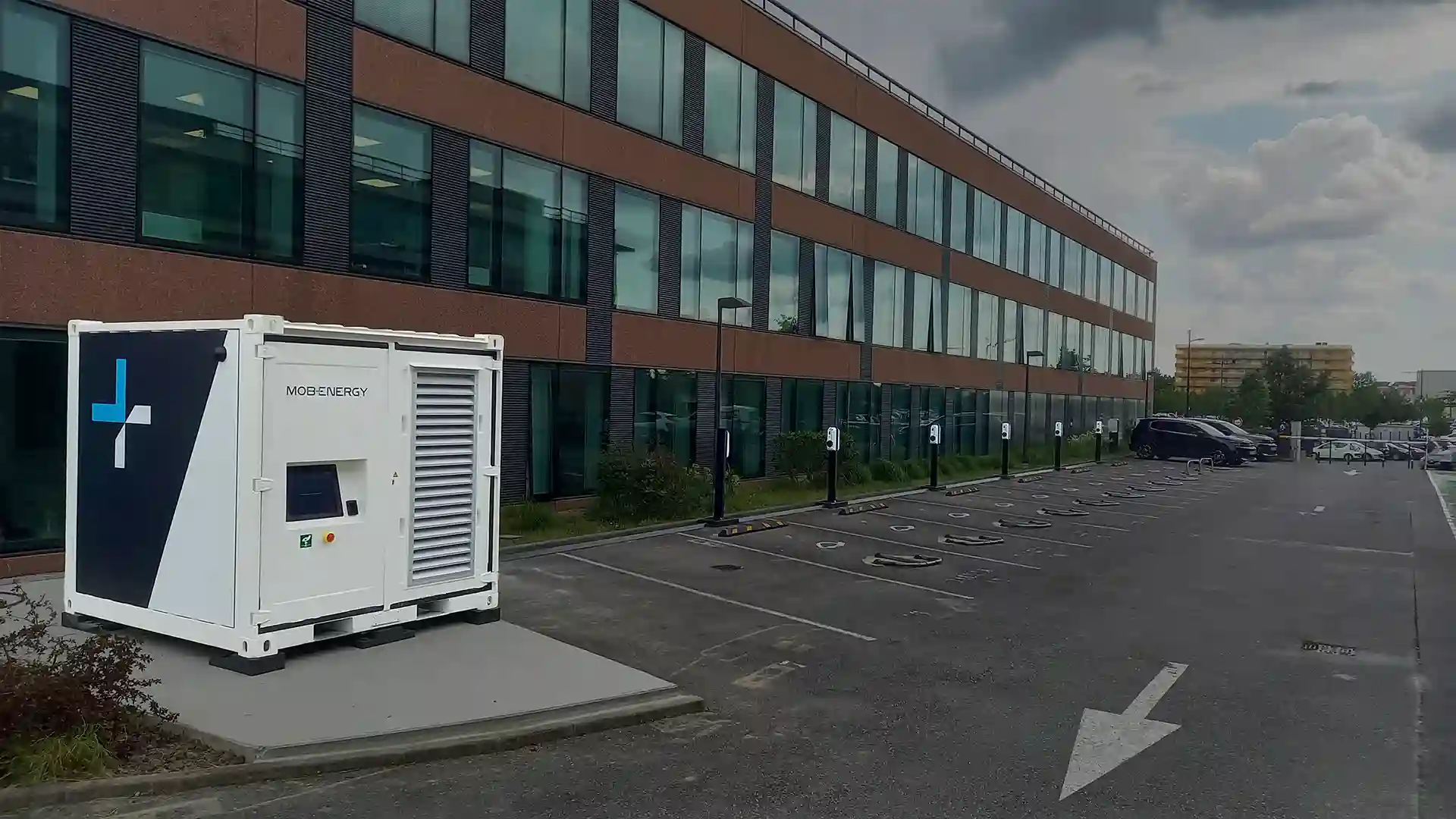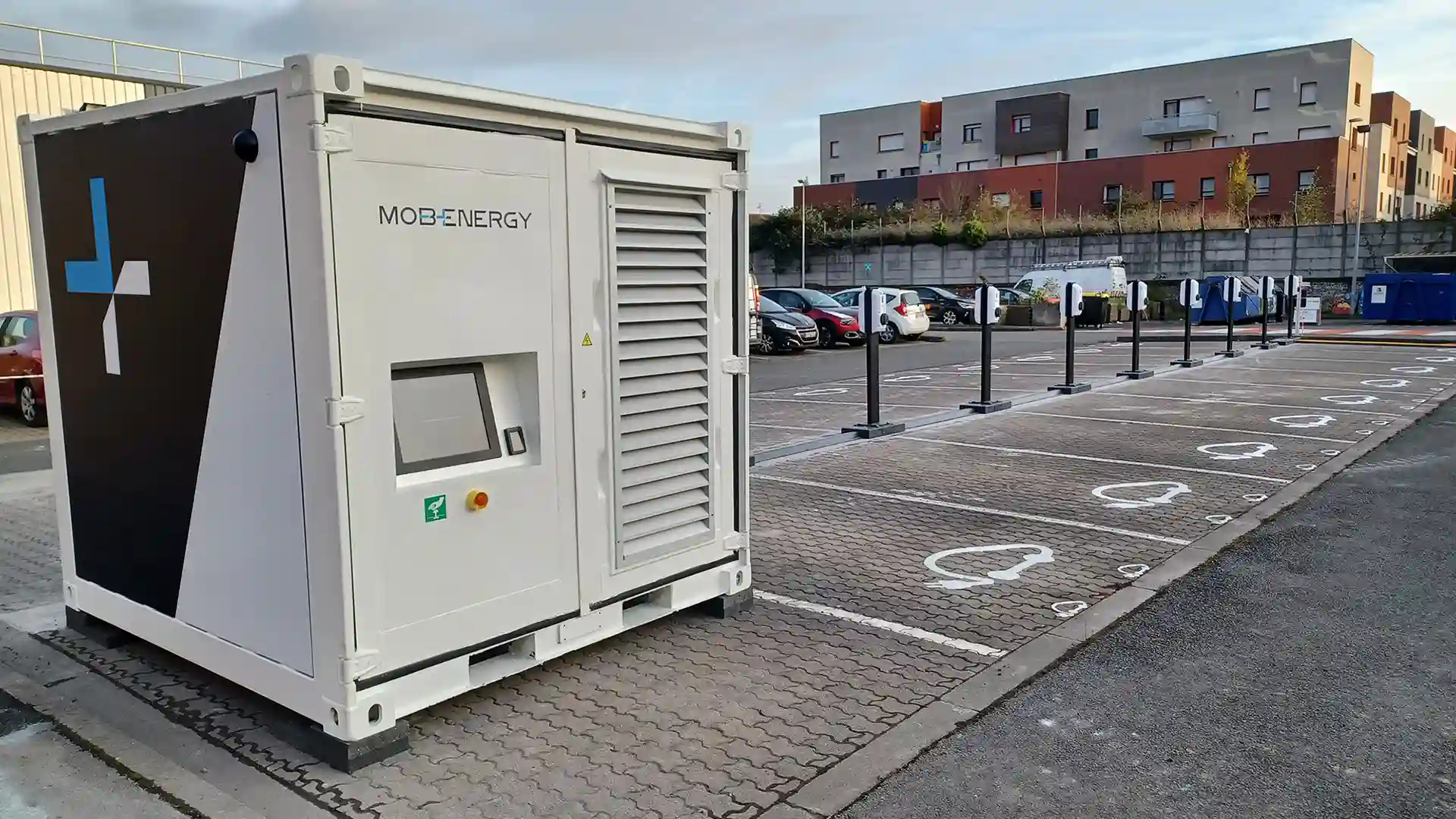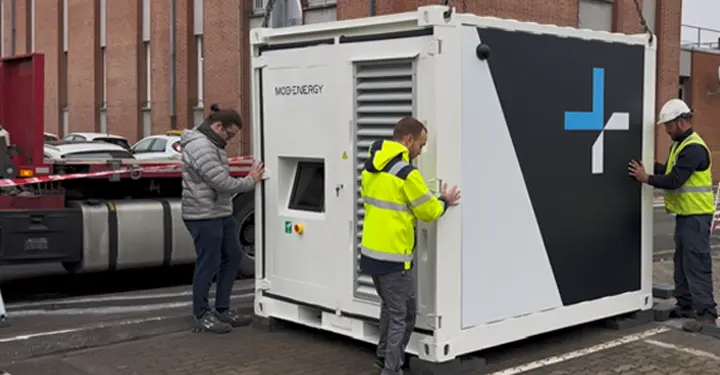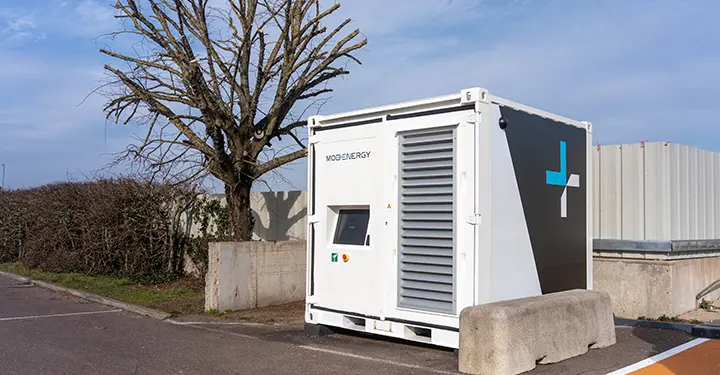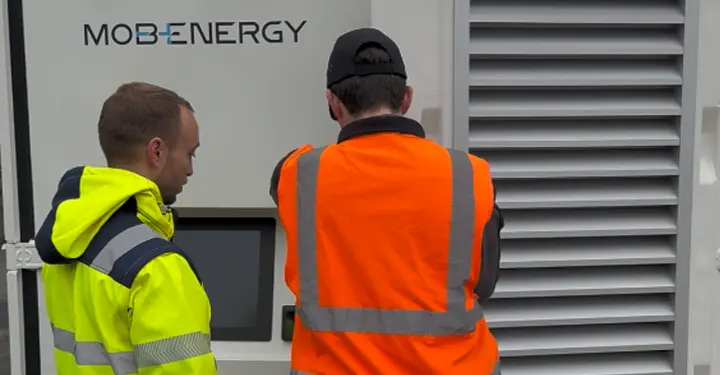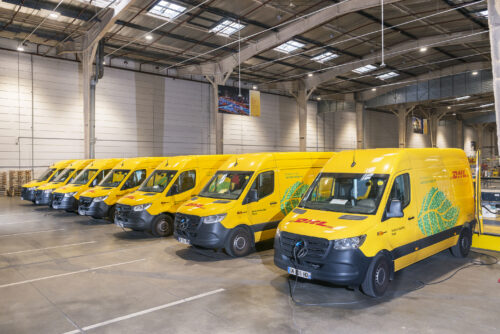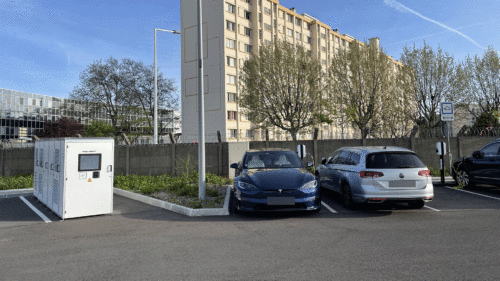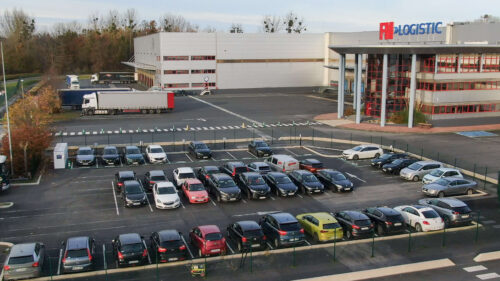Eiko Storage
Battery storage
With EikoStorage, activate a world of energy optimisation and savings for your site. Our BESS battery storage unit is the energy asset of your smart building:
– smooth out your power calls,
– shift your consumption to off-peak hours,
– maximise self-consumption of your solar production,
– and boost your recharging infrastructure.
By increasing the energy flexibility of your building and the electricity grid, you reduce your operating costs and generate new revenue.
With EikoStorage, activate a world of energy optimisation and savings for your site. Our BESS battery storage unit is the energy asset of your smart building: smooth your power calls, shift your consumption to off-peak hours, maximise the self-consumption of your solar production, and boost your recharging infrastructure. By increasing the energy flexibility of your building and the electricity grid, you reduce your operating costs and generate new revenue.
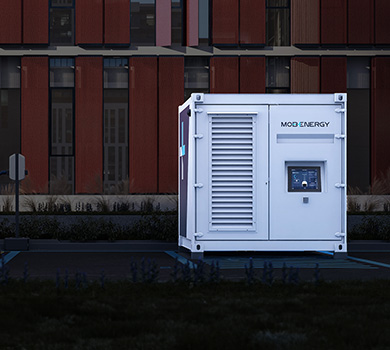
A world of optimisations for your building
Thanks to battery storage, reduce the power demand on the grid and avoid costly upgrades. By feeding electricity back into the grid during peak consumption periods, the platform limits power surges (peak shaving). This provides you with a stable and optimised storage station that can meet all your building’s energy needs, including its EV charging station, without the need to increase your electricity subscription.
Thanks to battery storage, reduce the power demand on the grid and avoid costly upgrades. By feeding electricity back into the grid during peak consumption periods, the platform limits power surges (peak shaving). This provides you with a stable and optimised storage station for your building and your EV charging infrastructure without the need to increase your electricity subscription.
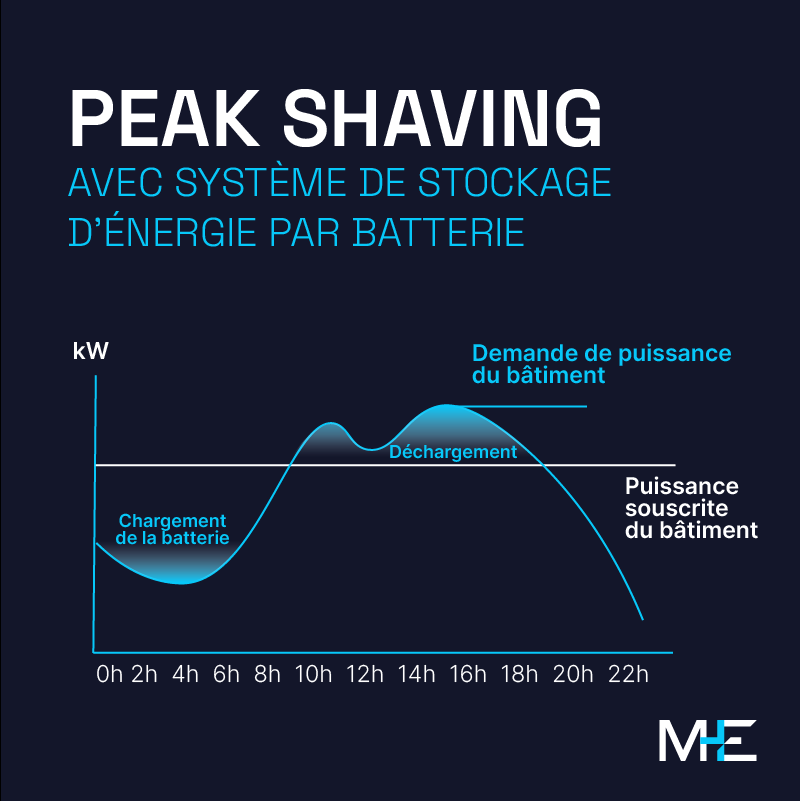
Technical details
Cumulative units of 200 kWh / 100kW
During off-peak hours
Solar production surplus
Exterior
On the low-voltage switchboard or on EikoLink
Energy management
GTB/EMS coupling
Grid reinjection
Your BESS project
Every building is different. Every customer has their own energy needs.
That’s why our storage solutions are modular and scalable, so that your energy infrastructure can respond perfectly to your needs at all times.
Batteries for business storage
What is an energy storage battery?
A battery energy storage system (BESS) stores the electricity produced by solar panels or from the electricity grid during off-peak hours (at night, for example) and releases it during the day, when it is needed.
A storage battery is based on three main components:
-
The battery modules, which store the electrical energy.
-
The inverter, which converts the stored direct current (DC) into alternating current (AC) that can be used by equipment or fed back into the grid.
-
The controller, the real brain of the system, which supervises energy flows, controls charging and discharging cycles, and ensures the operational safety of the installation.
Installing battery storage helps businesses cut costs, gives them energy flexibility and enhances the sustainability of their facilities. This system is a genuine technical solution for storing electrical energy, adaptable to any type of solar installation.
How does an energy storage system work?
The operation of a battery storage system is based on the principle of storing, converting and returning energy according to the needs of the site. When a surplus of electricity is produced, for example via photovoltaic panels or during off-peak hours, the system converts this energy into direct current (DC) and stores it in battery modules.
These batteries, often lithium batteries, store the energy in chemical form until it is needed again.
When energy demand increases, the storage battery releases the stored energy.
The inverter then converts the direct current into alternating current (AC) to power electrical equipment or feed electricity back into the grid.
The whole process is controlled by a central controller and an energy management system (EMS), which :
-
Continuously measure production and consumption,
-
Adjust charging and discharging power,
-
Ensure safe cycles and long battery life,
-
And optimise the site’s overall energy yield.
This principle acts as an energy recovery system for battery storage, optimising each charge and discharge cycle.
What are the advantages of energy storage for businesses?
The BESS storage system brings tangible benefits for businesses:
-
Reduced energy costs by controlling peak consumption,
-
Optimisation of self-consumption of photovoltaic energy,
-
Secure power supply in the event of a power cut,
-
Flexible operation thanks to the modularity of installed capacity,
-
Direct contribution to CSR performance and the energy transition,
-
Use of stored energy to recharge your electric vehicles.
Companies equipped with BESS batteries and energy storage solutions benefit from increased autonomy and optimised management of their consumption. A properly sized system also helps to stabilise the internal network, reduce bills and improve your overall energy autonomy.
How much does it cost to store electricity using batteries?
The price of battery electricity storage depends on a number of factors:
-
The storage capacity expressed in kWh,
-
The installed power (kWp) and the number of cycles required,
-
The level of integration with an existing solar array,
-
Intelligent options (connected meter, remote supervision, automation).
Energy storage systems are scalable: you can start with a basic pack, then add extra modules as your needs change. The initial investment is quickly offset by savings on electricity bills and control over peak tariffs.
How long does a storage system last?
A battery storage system has an average life of 10 to 15 years, depending on the technology used and the depth of discharge.
The different types of battery include lithium-ion, sodium-ion, flow batteries and advanced lead-acid batteries.
For example, high-voltage lithium batteries can withstand up to 6,000 cycles without major degradation, thanks to intelligent thermal and electrical management.
A correctly dimensioned installation, combined with smart control and preventive maintenance, guarantees stable performance, a long-term guarantee and enhanced energy sustainability.
This type of electricity storage battery guarantees sustainable performance over several years.
Is energy storage safe for business use?
Yes, energy storage systems in France must comply with European standards (CE, IEC, ICPE) and incorporate active safety features:
-
Real-time monitoring of temperature and voltage,
-
Automatic shutdown systems in the event of an electrical hazard,
-
Robust physical design and protection against overvoltage.
The modules are waterproof, ventilated and protected against water and dust (high IP rating).
Installation by a certified professional ensures network compatibility, optimum security and full regulatory compliance for industrial, tertiary or logistics sites.
How is battery energy storage helping the energy transition?
Electrical energy storage is a cornerstone of the corporate energy transition.
It makes it possible to store locally produced solar energy, reduce dependence on the grid, and consume electricity produced on site at the most relevant time.
This autonomous mode of operation enhances energy efficiency, limits CO₂ emissions and promotes a balance between production, storage and use.
Battery-based electricity storage contributes to sustainable business energy savings and the development of local renewable energy.
By integrating energy storage into an existing solar installation, a company can stabilise its consumption, ensure its energy resilience and actively participate in the decarbonisation of its activities.






